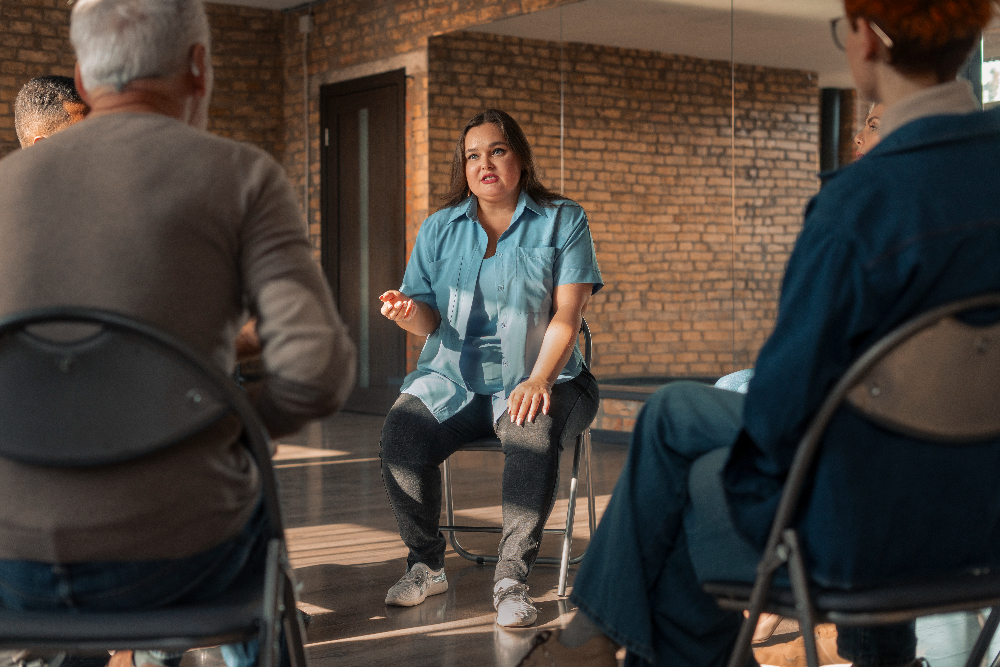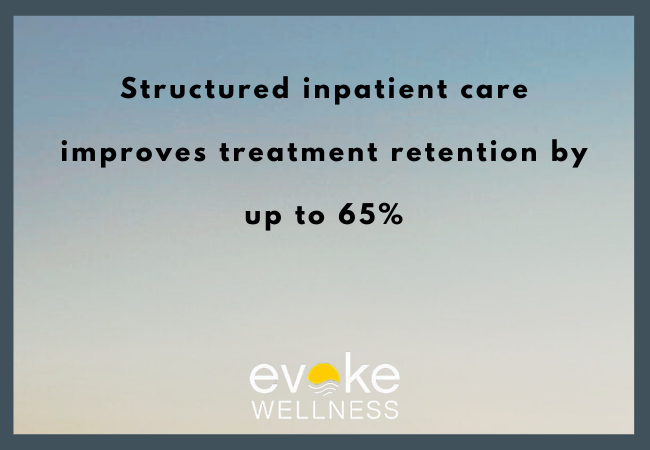Choosing inpatient rehab can be one of the most important—and intimidating—decisions someone makes in the recovery journey. Many people ask, “What will my days look like? Will I be supported? Can I really do this?”
At Evoke Wellness, our goal is to ease those fears by providing a structured, compassionate, and empowering environment that promotes true healing. Whether you’re entering an Intensive Inpatient Treatment Program, transitioning into a Partial Hospitalization Program, or continuing care in a Residential Mental Health Treatment Program, your daily routine is built around consistency, safety, and purpose.
Let’s walk through a typical day in inpatient rehab at our trusted Behavioral Health Treatment Center, and see how every hour is designed to support your recovery.
Morning: Grounding in Structure and Routine
Wake-Up and Personal Care
The day starts early—usually around 7:00 to 8:00 AM. Structure is key in recovery, and establishing a morning routine helps retrain the mind and body after months or years of disruption.
Clients are encouraged to begin the day with:
- Personal hygiene
- Mindfulness exercises
- Quiet reflection or journaling
Medication and Health Monitoring
Clients receiving Medication-Assisted Treatment (MAT) or psychiatric medications meet with medical staff for morning meds and vital sign monitoring. This daily touchpoint ensures stability and tracks progress in real time.
Nourishing Breakfast
A well-balanced, nutritious breakfast is served in a communal dining area. Mealtimes are not only for fueling the body but also for building healthy social habits and peer support.
Mid-Morning: Clinical and Therapeutic Programming
Group Therapy
Group therapy typically kicks off the treatment day. Led by licensed therapists, these sessions explore essential topics such as:
- Relapse prevention
- Emotional processing
- Boundaries and relationships
- Coping with trauma or stress
In our Behavioral Health Programs, group therapy is a powerful space for shared healing, accountability, and connection.
Individual Therapy
Throughout the week, clients participate in one-on-one sessions with a primary therapist. These deeper sessions often address:
- Underlying trauma
- Mental health diagnoses
- Self-esteem and identity
- Personal treatment goals
Therapists may utilize evidence-based modalities including Cognitive Behavioral Therapy (CBT), Dialectical Behavior Therapy (DBT), and Trauma-Informed Therapy.
Midday: Wellness, Reflection, and Medical Care
Psychiatric Evaluations or Medication Adjustments
For those enrolled in our Mental Health Treatment Programs, psychiatric check-ins are essential to track medication effectiveness and mental health progress.
Lunch
A chef-prepared lunch provides another opportunity to nourish both body and community. Many clients report mealtimes as one of the most grounding parts of their day.
Family Therapy or Case Management
Family therapy may be scheduled during midday hours (in-person or virtually). Clients also meet with case managers to develop discharge plans, coordinate next steps, and receive life-skills coaching.
Afternoon: Experiential and Holistic Therapies
At Evoke Wellness, we believe healing happens through both words and experiences. Our afternoon sessions often include:
- Art and music therapy
- Yoga and movement classes
- Guided meditation or breathwork
- Life-skills or psychoeducation workshops
- Emotion regulation and stress management techniques
These sessions are key components of both our Residential Mental Health Treatment Program and our Intensive Inpatient Treatment Program, offering diverse ways to engage in healing.
Evening: Community, Reflection, and Winding Down
Dinner
Dinner is another structured mealtime focused on nourishment, connection, and decompressing from the day’s work.
Peer Support or 12-Step Meetings
Evenings may include peer-led support groups, 12-Step meetings (e.g., AA, NA), or process groups. These gatherings reinforce community, reduce isolation, and provide practical relapse-prevention strategies.
Quiet Time and Journaling
Clients have time to journal, read, or engage in quiet reflection. Staff are on-site to support individuals emotionally or medically as needed.
Lights Out
Bedtime routines typically begin around 9:30–10:00 PM. Consistent rest is essential for emotional regulation, physical recovery, and cognitive function.
How Inpatient Rehab Builds Lifelong Recovery Skills
While every part of the daily schedule is structured to support immediate healing, inpatient rehab is also about building lifelong resilience. At Evoke Wellness, our programs focus on helping clients develop practical, emotional, and social skills that extend far beyond discharge.
Emotional Regulation and Self-Awareness
Through therapy, mindfulness, and psychoeducation, clients learn to:
- Recognize emotional triggers
- Develop healthy coping strategies
- Practice grounding techniques
- Improve self-compassion and confidence
Communication and Relationship Repair
Group work, family therapy, and skill-building groups help individuals:
- Set boundaries
- Navigate conflict
- Rebuild family trust
- Communicate assertively and clearly
Accountability and Daily Structure
Rebuilding routines, showing up for appointments, and following through with personal goals reinforces:
- Self-discipline
- Motivation
- Internal accountability
- A return to self-respect
Life Planning and Recovery Tools
Clients leave with personalized plans for:
- Continuing care (PHP, outpatient, sober living)
- Medication management
- Career or education re-entry
- Relapse prevention strategies
In short, inpatient rehab at Evoke Wellness doesn’t just stabilize—it equips clients to succeed in life.
Why Choose Evoke Wellness for Inpatient Rehab?
Choosing where to begin your recovery journey is one of the most important decisions you’ll ever make. At Evoke Wellness, we don’t just provide treatment—we offer transformation.
Our Intensive Inpatient Treatment Program and Residential Mental Health Treatment Program are designed with one goal in mind: to help you reclaim your life with dignity, structure, and compassionate support. Every element of our program—from our clinical services to our holistic therapies—is built around your individual needs, your history, and your potential.
Here’s what sets us apart:
Compassionate, Experienced Staff
Our licensed therapists, physicians, and nurses aren’t just highly trained—they’re deeply committed to walking alongside you with empathy, consistency, and care.
A Safe, Supportive Environment
Healing happens best in a place where you feel safe, understood, and respected. At our state-of-the-art Behavioral Health Treatment Center, you’ll find peace, privacy, and the security you need to focus fully on yourself.
Whole-Person, Trauma-Informed Care
We treat more than symptoms. We treat the person behind them. Our programs address the mental, emotional, physical, and spiritual aspects of recovery—especially for those with co-occurring mental health conditions.
Structured, Personalized Programs
From morning meditation to evening group therapy, every part of your day is designed to promote recovery and build healthy, sustainable habits. We tailor treatment plans based on your specific goals, diagnosis, and background.
Seamless Step-Down Support
Your journey doesn’t end after inpatient rehab. With direct access to our Partial Hospitalization Program and long-term aftercare planning, we ensure you’re supported every step of the way—even after discharge.
Conclusion
When you’re struggling with addiction or mental health challenges, every day can feel like a battle. But at Evoke Wellness, each day becomes a building block—one where healing begins, confidence is restored, and hope returns.
Inpatient rehab is not just about getting through the day. It’s about learning how to live again. It’s about rediscovering who you are without pain, without substances, and without shame. One day at a time, we help you rebuild—until you’re strong enough to stand on your own.
You don’t have to know what your whole journey will look like. You just have to be willing to take that first step. And when you do, we’ll be here to walk beside you—every single day. Together, let’s embrace the journey to recovery and the promise of a new beginning. Call us at 866.429.2960 today or reach out online.
Frequently Asked Questions (FAQ)
What is inpatient rehab like on a daily basis?
Inpatient rehab offers a structured daily schedule that includes group therapy, individual counseling, medical check-ins, holistic activities, meals, and rest. Each day is designed to promote emotional stability, physical wellness, and long-term recovery.
How long do most inpatient rehab stays last?
The average stay in an Intensive Inpatient Treatment Program can range from 14 to 30 days or longer, depending on individual needs, clinical recommendations, and progress. Evoke Wellness also helps clients transition into step-down levels of care such as our Partial Hospitalization Program.
What kind of therapies are offered in inpatient treatment?
At Evoke Wellness, clients receive evidence-based therapies such as Cognitive Behavioral Therapy (CBT), Dialectical Behavior Therapy (DBT), trauma therapy, family therapy, and holistic approaches like yoga and meditation—all part of our Behavioral Health Programs.
Can I receive mental health treatment in addition to addiction support?
Yes. We specialize in dual-diagnosis care, meaning clients with both substance use and mental health conditions receive integrated services in our Residential Mental Health Treatment Program and other levels of care.
What happens after inpatient rehab?
After inpatient treatment, clients often transition to a Partial Hospitalization Program, outpatient therapy, or aftercare support. At Evoke Wellness, we create a personalized discharge and recovery plan to support ongoing success and stability.



